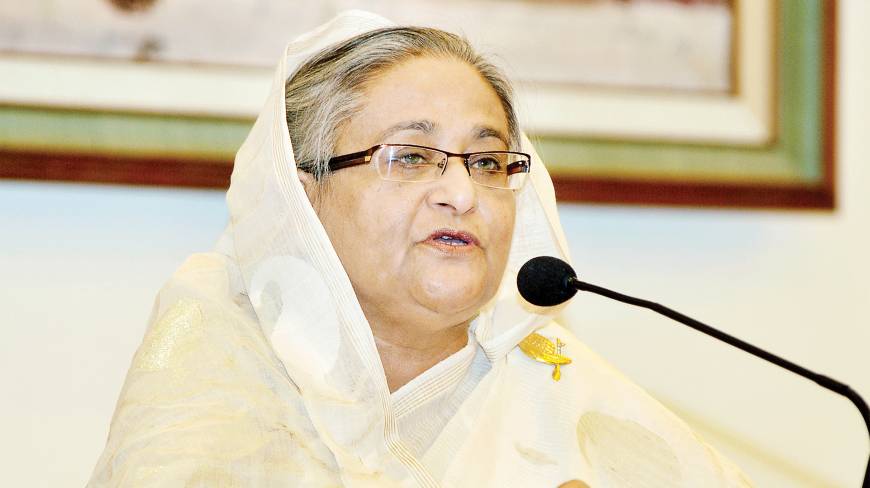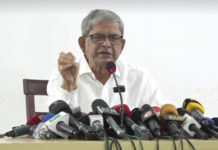A section of leaders believe that the premier and party chief actually did not mean anyone when she made the remark
Prime Minister Sheikh Hasina’s Sunday comment that everybody in her party but she could be bought has caused some senior leaders embarrassment who said it could lead to unpleasant consequences.
A senior leader close to Hasina told the Dhaka Tribune yesterday that the comment might even lead to a crisis of trust among the leaders which could eventually prove to be detrimental to the party.
However, a section of leaders believe that the premier and party chief actually did not mean anyone when she made the remark.
Towards the end of Sunday’s parliament sitting, a number of Awami League leaders and ministers approached Hasina regarding the judges’ impeachment bill.
Referring to senior lawyers Dr Kamal Hossain and Amir-Ul-Islam, who had been opposing the bill, they tried to speculate whether bringing the power back to the legislature could trigger any difficulty for the government and the party.
In reply, Hasina told them that “all Awami League leaders could be bought except Sheikh Hasina and that is the problem” and left the House.
Awami League Presidium member Nuh-ul-Alam Lenin said it would not be wise to comment on this issue without knowing the context and being sure whether she had made the remark at all.
“I am sure she will give an explanation to the people of the country. Otherwise, it [the comment] may turn out to be detrimental to the party. The opposition parties may use this as a weapon,” Lenin said.
It is often said that Hasina does not trust too many people around her. Insiders say there has always been a strong interest within the party that has been making things difficult for her over the years.
Seeking anonymity, a senior leader said her comment might be an expression of the lack of trust.
Insiders said the standoff between Hasina and a group of senior leaders had come to the surface strongly during the 2007-08 tenure of the army-backed interim government.
The interim government was allegedly trying to implement the so-called “minus two” formula by eliminating Hasina and BNP chief Khaleda Zia from Bangladesh’s politics.
The senior Awami League leaders openly challenged Hasina’s authority and tried hard to remove her from the helm. Leaders close to Hasina alleged that it was because of these so-called pro-reform leaders that she had to go to jail.
However, Hasina did not let things go out of her hands and came back strongly; but once again she failed to do anything substantial against those pro-reform leaders.
When she was regaining her grounds, Hasina employed some mid-level leaders loyal to her to keep a close watch on those senior leaders. The mid-level leaders used to report to her on the daily activities and movements of those anti-Hasina leaders.
After the Awami League came to power in 2009, Hasina started using the state intelligence mechanism for the task, party sources said.
Seeking anonymity, several senior leaders and ministers told the Dhaka Tribune that they had been under the prime minister’s constant monitoring. They believe that various state intelligence agencies do the job for her.
Some of them said even their phones were tracked and tapped. They claimed of getting the idea from Hasina herself who once said at a party forum that she knew everything they were doing and saying.
After that many of these leaders have stopped talking to journalists over phone.
Asked about Sheikh Hasina’s comment in parliament on Sunday, Awami League Presidum member Suranjit Sengupta told the Dhaka Tribune: “Sheikh Hasina has gone through a lot in her political career. She has seen a lot of bloodshed and been victims of many of those. She might have made that comment from that experience.”
Suranjit, however, said: “But I do not believe that she literally meant everyone. She always likes to talk frankly. It could be one of those frank talks.”
Awami League Joint General Secretary Mahbub-ul-Alam Hanif said: “Sheikh Hasina has been involved with politics for a long time. She was there beside Bangabandhu. She has also seen what roles politicians played after 1975.
“There has been many ups and downs in her career after she became the party chief in 1981. At that time, she got the chance to see many politicians from close quarters. She has also seen some leaders’ roles after 1/11. Therefore, I think her remark was appropriate considering the experience she has.”
Source: Dhaka Tribune










